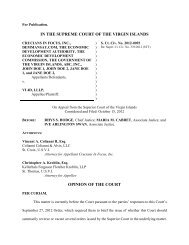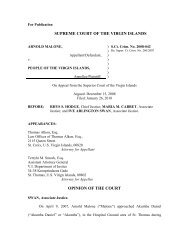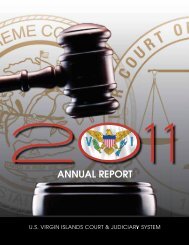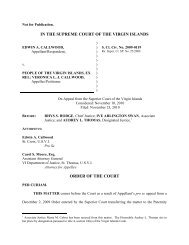IN THE SUPREME COURT OF THE VIRGIN ISLANDS OPINION OF ...
IN THE SUPREME COURT OF THE VIRGIN ISLANDS OPINION OF ...
IN THE SUPREME COURT OF THE VIRGIN ISLANDS OPINION OF ...
Create successful ePaper yourself
Turn your PDF publications into a flip-book with our unique Google optimized e-Paper software.
Maso v. MoralesS. Ct. Civ. No. 2011-0068Opinion of the CourtPage 7 of 9RESTATEMENT (SECOND) <strong>OF</strong> TORTS § 928. Consequently, a plaintiff could provide evidence ofthe value of her property before it was harmed, and after, and the difference would constitute herdamages award. Alternatively, at her election, she could provide evidence of the cost to repairthe property. See Int’l Rental & Leasing Corp. v. McClean, 303 F. Supp. 2d 573, 577 (D.V.I.App. Div. 2004) (“While the trial court may reduce damages or choose to not award damages ifthe plaintiff’s estimate is unsupported or inaccurate, the trial court may not completely rejectcompensatory damages simply because the plaintiff chose one reasonable means of estimatingdamages instead of another.”). This evidence does not require that at the time of the litigation,the plaintiff still possess the property; the evidence could be acquired before the plaintiff loses,sells, destroys, or otherwise becomes dispossessed of it. The subsequent destruction of propertywill not bar recovery in every case. 9 See Rafal v. Rafal, 198 A.2d 177, 178-79 (Del. Ch. 1964)(in a divorce proceeding in which the wife was alleged to have impermissibly taken her spouse’sproperty, stating that the subsequent destruction of the property by fire prevented the court “fromhaving specific evidence as to the condition of the property at the time it was taken,” but did notdeprive the claimant of damages, because “[t]he court must do the best it can”).Deciding that a plaintiff could succeed on a damages claim even where the property wassubsequently destroyed by an independent act does not entirely resolve Maso’s case. Maso must9 Indeed, there is no extant authority for the proposition that a claimant’s property must not be subsequently destroyed inorder for her to succeed on a claim for damages, or to establish the value of that damage. The judges’ contrary interpretationof the law of unjust enrichment in this case must be expressly rejected. Typically invoked in breach of contract or quasicontractsuits, unjust enrichment is defined as the “retention of a benefit conferred by another, without offeringcompensation in circumstances where compensation is reasonably expected.” Peppertree Terrace v. Williams, 52 V.I. 225,242 (V.I. 2009) (Swan, J., concurring) (citing Black's Law Dictionary 1573 (8th ed. 2004)). “One is not unjustly enriched byreceipt of that to which he is legally entitled.” Smith v. Whitener, 856 S.W.2d 328, 329 (Ark. Ct. App. 1993) (citingMerchants & Planters Bank & Trust Co. v. Massey, 790 S.W.2d 889 (Ark. 1990)). “To find unjust enrichment, a party musthave received something of value to which he is not entitled and which he should restore.” Id. Awarding Maso damages forthe cost of repairing her car where the car was subsequently destroyed does not meet this definition. The magistrate foundthat Morales’s negligence caused the accident, creating a legal right to recovery. There can be no unjust enrichment wherethe person enriched is legally entitled to the enrichment.
















